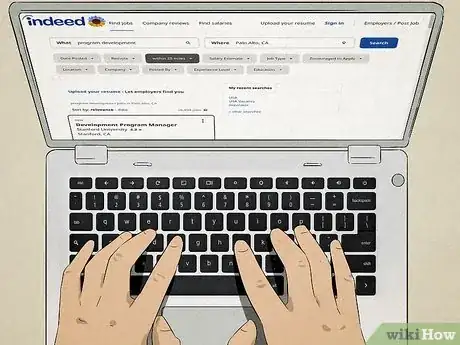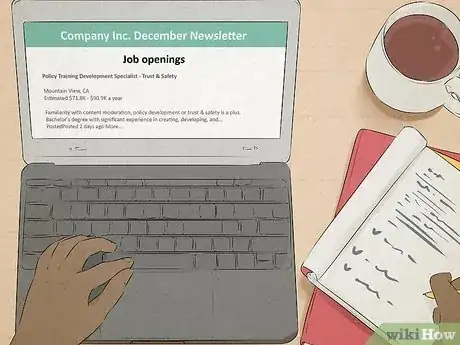This article was co-authored by Colleen Campbell, PhD, PCC. Dr. Colleen Campbell is the Founder and CEO of The Ignite Your Potential Centers, Career and Life Coaching based in the San Francisco Bay Area and Los Angeles. Colleen is an International Coach Federation accredited Professional Certified Coach (PCC). Colleen received her MA and PhD in Clinical Psychology from Sofia University and has been career coaching since 2008.
There are 8 references cited in this article, which can be found at the bottom of the page.
This article has been viewed 66,086 times.
There are many reasons someone may receive a demotion at work, and not all have anything to do with work performance. Perhaps the company is downsizing or going through reorganization.[1] No matter the reason, the experience can be very hurtful and humiliating, but there are things you can do to ease the sting and improve both the situation and future of your career.
Steps
Staying Professional
-
1Remain calm. When you are informed of the demotion, do your best to keep your immediate emotions in check and not take the news personally. Remember, there are several possible reasons for the demotion. An emotional display or bad attitude will only make things worse before you have had time to make good decisions.
-
2Ask for clarification of the situation. Speak with your supervisor. Ask for a meeting if they didn't tell you in person. In the privacy of the meeting you can request more specific information that you may be lacking, such as the reason for, and tangible consequences of, the demotion.[2] Ask about things such as:
- The extent of your pay cut.
- Your new job responsibilities.
Advertisement -
3Ask for a detailed performance review. Really listen to what your supervisor has to say. It may be that they have some good information that can help you improve if it turns out the demotion actually is due to your work.
-
4Stay respectful. Although it can be very difficult to hear any negative critiques of your work, being receptive and respectful in your exchange tells them that you care about the company and your standard of work. This can help you in the long run by assuring your continued employment while you make important decisions about your future.[3]
- If you feel you will not be able to remain professional due to your emotions, ask your boss for half-day leave or a day off to process, but be prepared to do the best you can if they deny your request.
-
5Call on your friends and family. Call on those who are part of your support system once you are away from work and able to vent. They will not only shore you up emotionally, bring fresh perspectives to the situation.
- It is unwise to discuss the details with co-workers, as it can place both them, and you, in uncomfortable or compromising positions.
Seeking Resolution
-
1Get it in writing. Having the demotion, and all its specifics, in writing can keep things clear and make certain you and your supervisor are on the same page about what is now expected of you.[4]
-
2Document everything related to the demotion. You might not need any of this information, but you never know, and it's better to have everything documented than to realize too late that it could have helped you.
- Just to be on the safe side, keep the documentation on a home computer or flash drive, not on your work computer.
-
3Consider accepting the decision if the rationale makes sense. You might, for example, decide to deal with the decision if it comes from company reorganization or is warranted based on your performance. Although a demotion can seem on the surface like nothing but a negative, there are times when it presents a positive move forward for you and your career, such as:[5]
- A chance to work with new people on new projects.
- The chance to grow by developing new skill sets.
- Less responsibilities, therefore less stress.
- The possibility of having more time to spend with family.
- Freedom from difficult co-workers or a toxic environment.
-
4Appeal the decision internally if you can show it is unjust. Many organizations have an internal mechanism in place for appealing decisions such as firings and demotions. If your company has such an option in place, there are times when this might be the right path for you to consider, such as:[6]
- You truly believe that the demotion is unjust due to misinformation.
- You have evidence that the demotion is directly due to discrimination of some sort from the supervisor demoting you.
- You want the chance to challenge the decision and plead your case.
-
5Seek outside intervention if you have no other recourse. If internal appeals don't work or you simply don't trust the internal process, you can consider the more drastic approach. Although this option can create a hostile situation between you and your employer, depending on the situation and the company you work for, you may need the support of a mediator or an employment lawyer to help you in your search for resolution.[7] Times when this might be necessary can include:
- Your company lacks any avenue to address worker grievances.
- A badly handled appeal process resulted in a rejection of your claim.
- You feel you cannot get a fair hearing due to internal prejudice.
Looking to the Future
-
1Appreciate what you have. It might not feel like it, but a demotion is better than being fired outright. Let yourself appreciate the fact that you still have a paycheck that will buy you the time to decide how you want to move forward.[8]
-
2Keep your network. Don't burn bridges by becoming difficult or overly emotional at work. The more pleasant and professional you stay, the more likely it will be that you will have others willing to help you, speak up for you, or give you references should you move on to other job prospects.
-
3Explore other job possibilities. Discreetly looking for other job openings while staying professional in your new position will open up possibilities while keeping you financially supported.
- Being discreet is important, as announcing the fact that you are looking at other jobs will give the impression that you don't respect your current company and aren't likely to be working to the best of your abilities.
-
4List trusted individuals who might help. A contact list of co-workers you trust who are likely to write letters of recommendations will come in handy if you find a new position you would like to apply for.
-
5Monitor other possible openings within the company. Internal job boards or company newsletters may regularly list jobs that you could apply to that would allow you to move laterally. A lateral move, rather than a vertical one, can present new possibilities you weren't previously aware of.
-
6Offer to take a cut in pay in exchange for keeping your title. Your title has staying power; it shows up on your resume while your pay does not. Although a cut in pay can be problematic at the time, the title on your resume has value that can translate into a much better paying job elsewhere in the future.[9]
-
7Learn from the situation. We often learn better from our mistakes and failures than from our successes. Once you understand what brought about the demotion, if it is anything that is within your power to change, then you can take that knowledge, grow from it, and use it to be more successful in the future.
-
8Enjoy your life. Whatever you decide to do, maintaining balance between your private life and your work life will go a long way to keeping you happier and healthier, which will ultimately lead to a successful life.
- Don't bring your work worries home with you.
- Keep friends and family close.
- Have fun.
Expert Q&A
-
QuestionHow do you bounce back after being demoted?
 Colleen Campbell, PhD, PCCDr. Colleen Campbell is the Founder and CEO of The Ignite Your Potential Centers, Career and Life Coaching based in the San Francisco Bay Area and Los Angeles. Colleen is an International Coach Federation accredited Professional Certified Coach (PCC). Colleen received her MA and PhD in Clinical Psychology from Sofia University and has been career coaching since 2008.
Colleen Campbell, PhD, PCCDr. Colleen Campbell is the Founder and CEO of The Ignite Your Potential Centers, Career and Life Coaching based in the San Francisco Bay Area and Los Angeles. Colleen is an International Coach Federation accredited Professional Certified Coach (PCC). Colleen received her MA and PhD in Clinical Psychology from Sofia University and has been career coaching since 2008.
Career & Life Coach Start by taking some time to reflect. If you get demoted, it's a good time to step back and look at your big picture goals. Take stock of what you're getting from the company to make sure you're in the right place. Then, try to make a plan for how you can do better and be successful in the future.
Start by taking some time to reflect. If you get demoted, it's a good time to step back and look at your big picture goals. Take stock of what you're getting from the company to make sure you're in the right place. Then, try to make a plan for how you can do better and be successful in the future.
Warnings
- Do not say anything bad about your company to anyone.⧼thumbs_response⧽
References
- ↑ http://www.forbes.com/sites/reneesylvestrewilliams/2012/08/31/how-to-deal-with-being-demoted/#7439495d3be1
- ↑ http://articles.chicagotribune.com/1994-08-07/features/9408070258_1_demotion-monica-executive-suite
- ↑ http://www.forbes.com/sites/reneesylvestrewilliams/2012/08/31/how-to-deal-with-being-demoted/2/#652f5564238f
- ↑ http://money.usnews.com/money/careers/articles/2014/05/06/how-to-handle-a-demotion-and-pay-cut
- ↑ http://www.cheatsheet.com/personal-finance/5-reasons-you-should-consider-a-demotion.html/?a=viewall
- ↑ http://www.monster.ca/career-advice/article/getting-demoted-at-work-ca
- ↑ http://www.lawyeredu.org/employment-lawyer.html
- ↑ http://www.forbes.com/sites/jeffschmitt/2013/01/15/8-ways-to-rebound-from-a-demotion/#2f0b7d9a1170
- ↑ http://money.usnews.com/money/careers/articles/2014/05/06/how-to-handle-a-demotion-and-pay-cut





































































